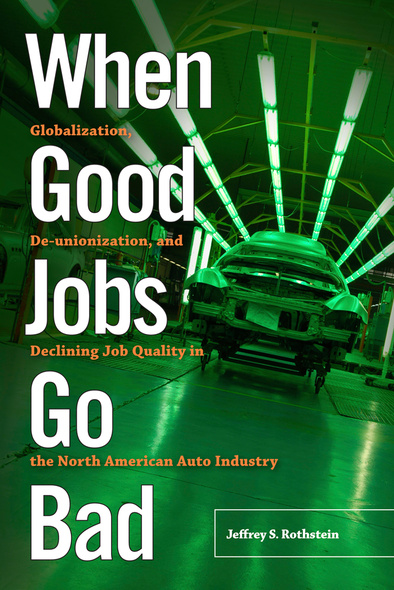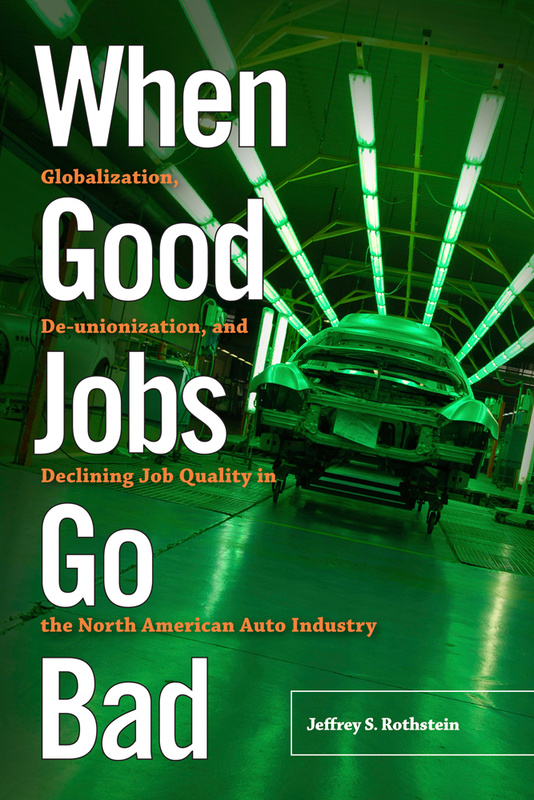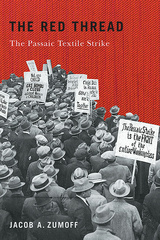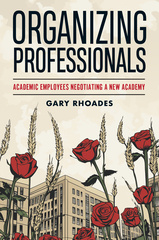
200 pages, 6 x 9
1 figures, 2 tables
Paperback
Release Date:16 Mar 2016
ISBN:9780813576053
Hardcover
Release Date:16 Mar 2016
ISBN:9780813576060
When Good Jobs Go Bad
Globalization, De-unionization, and Declining Job Quality in the North American Auto Industry
Rutgers University Press
From Chinese factories making cheap toys for export, to sweatshops in Bangladesh where name-brand garments are sewn—studies on the impact of globalization on workers have tended to focus on the worst jobs and the worst conditions. But in When Good Jobs Go Bad, Jeffrey Rothstein looks at the impact of globalization on a major industry—the North American auto industry—to reveal that globalization has had a deleterious effect on even the most valued of blue-collar jobs.
Rothstein argues that the consolidation of the Mexican and U.S.-Canadian auto industries, the expanding number of foreign automakers in North America, and the spread of lean production have all undermined organized labor and harmed workers. Focusing on three General Motors plants assembling SUVs—an older plant in Janesville, Wisconsin; a newer and more viable plant in Arlington, Texas; and a “greenfield site” (a brand-new, state-of-the-art facility) in Silao, Mexico—When Good Jobs Go Bad shows how global competition has made nonstop, monotonous, standardized routines crucial for the survival of a plant, and it explains why workers and their local unions struggle to resist. For instance, in the United States, General Motors forced workers to accept intensified labor by threatening to close plants, which led local unions to adopt “keep the plant open” as their main goal. At its new factory in Silao, GM had hand-picked the union—one opposed to strikes and committed to labor-management cooperation—before it hired the first worker.
Rothstein’s engaging comparative analysis, which incorporates the viewpoints of workers, union officials, and management, sheds new light on labor’s loss of bargaining power in recent decades, and highlights the negative impact of globalization on all jobs, both good and bad, from the sweatshop to the assembly line.
[Rothstein's] important point is that there is nothing natural or inevitable about the form that globalization takes; the global economy is a product of political choices.
Rothstein’s book provides us with much of what we need to understand why wages and the quality of work life in the US and Mexican auto industries has deteriorated since the late 1970s.
When Good Jobs Go Bad questions whether the tide is rising at all....This is a sobering read, but the final chapter explores some more hopeful possibilities....Perhaps the main lesson from this book is that there is no trade-off between workplace control and influence. When unions sacrifice the first, they risk losing both.
It’s not just McDonald’s and Walmart. Rothstein brilliantly illuminates how even auto assembly jobs—still among the best blue collar jobs—have been steadily degraded by global corporations. An essential contribution to understanding work in the global economy.
An important and insightful intervention in the discussions of industrial upgrading and the auto industry, Rothstein provides a striking critique of lean production and the decline of good jobs.
When Good Jobs Go Bad is an excellent study: strategically designed, executed well, historically grounded, theoretically fruitful, gracefully written, and blessedly free from jargon... Best of all, it furnishes students with a vibrant and contemporary examples of C. Wright Mills' 'sociological imagination' revealing the complex and unhappy intersections of biography and history in the lives of automobile workers.
Ultimately, U.S., Mexican, and for that matter Chinese workers will write the next chapters in the evolution of the global auto industry. But for right now, Rothstein’s book offers a powerful analysis of how those good jobs went so bad.
[When Good Jobs Go Bad] presents an automobile industry in decline. It begins with the North American Free Trade Agreement and recounts dramatic changes in employment and in the work environments at GM, Ford, and Chrysler … Summing Up: Recommended. Lower-division undergraduates through faculty.
[When Good Jobs Go Bad] presents an automobile industry in decline. It begins with the North American Free Trade Agreement and recounts dramatic changes in employment and in the work environments at GM, Ford, and Chrysler … Summing Up: Recommended. Lower-division undergraduates through faculty.
Ultimately, U.S., Mexican, and for that matter Chinese workers will write the next chapters in the evolution of the global auto industry. But for right now, Rothstein’s book offers a powerful analysis of how those good jobs went so bad.
When Good Jobs Go Bad is an excellent study: strategically designed, executed well, historically grounded, theoretically fruitful, gracefully written, and blessedly free from jargon... Best of all, it furnishes students with a vibrant and contemporary examples of C. Wright Mills' 'sociological imagination' revealing the complex and unhappy intersections of biography and history in the lives of automobile workers.
An important and insightful intervention in the discussions of industrial upgrading and the auto industry, Rothstein provides a striking critique of lean production and the decline of good jobs.
It’s not just McDonald’s and Walmart. Rothstein brilliantly illuminates how even auto assembly jobs—still among the best blue collar jobs—have been steadily degraded by global corporations. An essential contribution to understanding work in the global economy.
When Good Jobs Go Bad questions whether the tide is rising at all....This is a sobering read, but the final chapter explores some more hopeful possibilities....Perhaps the main lesson from this book is that there is no trade-off between workplace control and influence. When unions sacrifice the first, they risk losing both.
Rothstein’s book provides us with much of what we need to understand why wages and the quality of work life in the US and Mexican auto industries has deteriorated since the late 1970s.
[Rothstein's] important point is that there is nothing natural or inevitable about the form that globalization takes; the global economy is a product of political choices.
JEFFREY S. ROTHSTEIN is an associate professor of sociology at Grand Valley State University, in Allendale, Michigan.
Acknowledgments
1 Introduction: Three Auto Plants in the Global Economy
2 The Intensification of Work under Lean Production
3 Whipsawed! Local Unions Fight for Jobs in the United States
4 Greenfield Opportunity: Orchestrated Labor Relations in Silao
5 Globalization and Union Decline
6 Conclusion: Toward a Better-Regulated Global Economy
Notes
References
Index








